Wizards of the Coast, the company behind the extremely popular Magic: The Gathering collectible card game, has taken yet another stab at a PC re-creation of the tabletop game. In the past, Wizards has sanctioned the use of a variety of methods to impart the excitement of a duel between players, whether it be with animated versions of card art and characters, or with a gameplay system focused on challenging computer-controlled opponents in order to win cards to add to your collection. This time around, Wizards has enlisted developer Leaping Lizard Software, which has taken a direct, bare-bones approach to delivering an efficient tool that players can use to engage in card duels over the Internet. With Magic Online, you don't get many frills--just the cards, chat rooms inhabited by other people, and an easy-to-learn, efficient interface that can turn anyone into a competent deck builder and player. It's because of its accessible nature that Magic Online is undoubtedly the best software representation of Magic: The Gathering released thus far--quite possibly surpassing the physical card game in many respects.
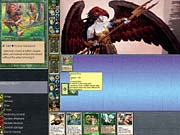
You may know that Magic: The Gathering, the card game that Magic Online is based on, is a competitive dueling game in which two or more players face off against their opponents in an attempt to defeat them using a variety of different cards representing magic spells. Each player begins the game with 20 life points, which can be reduced by direct magical assault or by the attacks of summoned creatures that are rated according to their power (the ability to deal damage) and toughness (the ability to withstand damage). Players can cast enchantments that can have permanent effects, and they can also make use of magical artifacts. Turns pass between players until someone's life total reaches zero, or someone runs out of cards. Achieving victory is based as heavily on technique as on the color or colors of magic chosen. There are five colors of magic: white, green, red, blue, and black. White magic is that of healing and light, green represents the forces of nature, red signifies chaos and fire, blue is the color of water and thought, and black embodies death and decay. In order to tap into these forces, players must make use of natural resources that channel this energy--plains for white, forests for green, mountains for red, islands for blue, and swamps for black. Play commences with each player drawing a hand of cards, then taking turns placing down land cards, one per turn, and rotating them in order to release mana points, which pay for spells.
Magic Online isn't the most visually stunning computer game available. In fact, much of what makes up Magic Online seems almost oversimplified from an aesthetic standpoint. The client looks like a Web browser with three major frames, including a chat box on the bottom, left-hand navigation, and a main window. Logging in to your Magic Online account is not unlike entering a collectible card game portal of sorts--you have access to many different destinations, including game-related Web sites, bug report forms, a moderator and support room, the Magic Online store, your collection manager, a deck editor, clan and league areas, and, of course, the various game rooms.
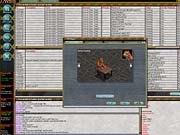
You select an avatar from a small selection of figures--including a goblin, wizard, or merfolk--that represents you in the game rooms. When participating in duels, these avatars go through a few frames of animation, and the overall effect of seeing a bunch of tigers and skeletons seated around a table, engaging in a rousing game of cards, can be humorous to say the least.
However, Magic Online does include the complete set of current Magic cards, including the seventh edition of the game and every expansion released since then. Each of the cards includes the original artwork, viewable in three different sizes, as well as the complete rules and flavor text. The illustrations on these cards feature a wide array of talented modern fantasy artists, and it's almost a shame that you can't view the impressive artwork in a gallery of some kind. There's plenty to work with as far as variety goes. There are more than 1,000 cards available in Magic Online, and countless types of decks can be built around their abilities.
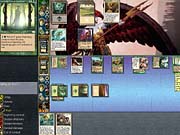
The gameplay takes place on a split playfield, where competing players' cards can be viewed as they are played. Playing a card can be as simple as a single click. Left-clicking generally plays cards from your hand, while right-clicking accesses each card's special abilities. Tooltips and pop-up information boxes relay all the information you'll need concerning a card's abilities, and a handy phases list on the left-hand side of the screen tells you what portion of a player's turn is being played and which cards are playable. In the game's preferences menu, you can select any and all of these phases, which let you set exactly how often you are prompted for confirmation before a player can proceed through the segments of his or her turn.
The game's interface is powerful. It lets you sort, organize, and make decks from your cards based on their color, rarity, and mana cost. But it isn't all that easy to pick up--it can get cluttered at times, and some of the more important icons in the game tend to be a bit too small to see clearly. However, once you get used to it, Magic Online's otherwise intuitive interface allows little room for errors in a game whose history has been filled with player arguments over rules. The Magic Online client itself is a judge. For all intents and purposes, players simply can't break the rules. You're forced to comply with card effects when played, shuffled cards are sorted randomly, life and mana totals are tracked, and the only thing you can really get away with is a mistaken land usage or attack command, for which there is a handy "undo" function that can be used before confirming. Only applicable targets for spells and the like are selectable, so players will always make a legal move.
In addition to standard one-on-one constructed-deck games, there are a handful of other match types to explore. Sealed-deck tournaments challenge players to purchase a new deck of cards as starting material and then build a deck to compete against others within an allotted time period. Booster drafts are games where much of a player's winning strategy is employed before a single card is dealt, with players selecting cards from a general pool. The variants for more than two players are particularly entertaining. Emperor and the two- and three-headed giant games let up to six players get together for matches in which cooperative gameplay is necessary.
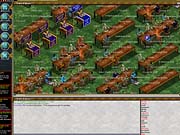
What is most significant about Magic Online is its focus on the sale of collectible digital information. The system Magic Online utilizes is much like the one pioneered by the online card game ChronX and THQ's WWF With Authority! Specifically, players pay Wizards of the Coast through the online Magic store for virtual booster packs and decks of cards in order to add to their virtual collection. Purchased packs of cards are sorted randomly, with the same chances of picking out a specific card, such as a holographic foil rare, as when buying a pack of cards over a store counter. Digital cards purchased from the Magic store sell for the same retail price as the physical counterparts, from $3.29 for a booster pack to $9.99 for a theme deck, as well as applicable sales tax. Because of this pricing structure, players will actually be purchasing a gift voucher good for 10 dollars' worth of cards at retail, instead of paying for the freely distributed game client. In fact, Wizards has made the Magic Online client available as a free download--the catch is that you'll have to buy all the cards yourself.
While players aren't receiving any physical goods in the transactions, which at launch require them to be over 18 with access to a major credit card, they are receiving cards that may well become every bit as valuable as those often kept in dusty binders and cardboard boxes. Each card is individually numbered using a secure encryption system and stored remotely, and the online cards can be traded instantaneously and in a safe manner. Instead of having to make a trip to a hobby shop, players can participate in the Magic: The Gathering tournament scene and ranking system online, which are identical to those of the collectible card game in every way, but much more accessible. At any given moment, there may be sanctioned tournaments going on, and players can enter them after purchasing event tickets to earn ranking points and prizes, including packs of cards and cash. Apparently the support that Wizards of the Coast is dedicating to Magic Online is considerable. Every current pro qualifier and scheduled championship tournament will have an online counterpart, with the entire professional scene being made available to players remotely.
Even those who don't plan to play for rankings can benefit from switching to the online counterpart of their card game. Managing a virtual collection with Magic Online is much simpler than dealing with a physical one. Spreadsheet views can be used to sort cards alphabetically or by set, quantity, casting cost, power, toughness, rarity, and more. Individual cards can be marked as set aside for trading, and any card can be seen from three different levels of zoom, allowing for simple browsing of the artwork or reading of the flavor text.
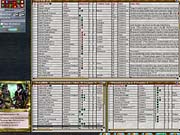
Dropping cards from your collection into a handmade deck is also a cinch, with drag-and-drop support, the ability to move duplicate cards at once, and split panels to negotiate the current deck, the total card pool, and the reserve set of cards known as the sideboard. Once a standard 60-card deck is put together, Magic Online also offers a statistics and probability tool to evaluate the deck's efficiency. Bar graphs and pie charts denote what proportion of the cards belong to the same mana symbol and how many total mana symbols of each type appear in the deck. An incredibly useful mana curve is also plotted, showing you the comparative casting costs of all cards in your deck, which helps you balance weak, medium-sized, and strong threats evenly.
As of the time of this writing, many parts of the game could do with additional tweaking, and certain features would have added significantly to the game's ease of use, such as mouse-wheel support for the game's spreadsheets and smoother frame rates for the dragging of outline boxes. Background music or a media player of some sort also would have helped. In fact, Magic Online's array of sound effects resemble Windows desktop theme sounds, including clapping hands, trumpet fanfares, and generic noises representing inflicted damage and combat.
While the visuals and audio in Magic Online could use significant improvement, the game's lack of graphic-intensive content allows for fairly low minimum system requirements. The game's turn-based nature makes it ideal for those with low-speed connections. Dial-up users with a 28.8 connection can play with very little inconvenience, making Magic Online ideal for those who have yet to spring for an upgrade or high-speed Internet access.
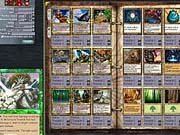
As an added incentive for players to collect as many cards as possible, Wizards of the Coast has initiated a redemption system that allows entire sets of cards to be traded in for their counterpart physical card sets. While most players won't feel the need to invest the resources into compiling a complete set, this inherently adds value to all the online cards in the game and makes stomaching the purchases required to become truly competitive a bit easier.
But you should step into Magic Online lightly and with caution: It isn't so much a game as it is a self-contained hobby. Those who entertain dreams of taking a shot at Wizards of the Coast's Pro Tour ranking system will need access to an absolutely huge collection of cards and very deep pockets. Just as with the physical cards, there is a definite advantage to be had for those who spend. However, casual players and those just looking to enjoy the elegant gameplay without spending a fortune should be able to supplement their hobby with refreshing new cards at less than the regular price of an online game subscription. Players of all levels of dedication should be able to appreciate Magic Online's addictive gameplay--even if they can't resist the urge to buy more cards.